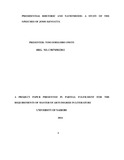| dc.description.abstract | This study focuses on the rhetoric of Jomo Kenyatta and its relationship to the Kenyan nation. It
is a critical approach to the statements made by Kenyatta during the formative ages of Kenya. I
explore how the utterances of leaders intersect with the histories of a nation. I also evaluate how
different or correct a leader’s statements can be in relation to what his or her actions. Since this
study is situated in literature, I examine the rhetorical aspects that my subject employs in
conveying his message to the targeted population.
The selected speeches were also made at the same time when the East African countries were
enthusiastic to federate; I therefore sought to engage with how themes such as federation and
Pan-Africanism were formulated through the performance of speech.
In conceptualizing the selected speeches, I highlight pertinent theoretical issues on rhetoric.
Rhetoric has the power to change perception and thus enhance change of policies. I also point
out that presidential rhetoric is so powerful that it can affect the economy and the social fabric of
the nation. In this study, I employed a close textual methodology in engaging with the speeches. I
read the texts through the lenses of formalist, reader-response, and literary Marxist theories.
These aspects of research lay the foundation to understanding the relationship between rhetoric
and the nation and also situate rhetoric into literature. The study also discusses at length the
controversial persona Jomo Kenyatta. By scrutinizing his utterances and actions as Kenya’s first
Prime Minister and then first President, the study brings out the presumed foundations
ofconscious marginalization of certain communities and regions of Kenya. In my discussion, I
point out areas where the texts under study are effectively used by its author to ‘other’ the rest of
Kenya while at the same time centering his ethnic community.
Throughout the discussion, I show that rhetoric is part of literature and speeches employ literary
aspects so as to persuade the audience. A study of speeches as literary texts is significant since it
focuses on the actual stylistic devices used in developing themes affecting the society. An area
that should also be studied is the performance of rhetoric in which a researcher can investigate
how the aspects of performance are enhanced during speech delivery. Such studies will
significantly enrich literature through the enhancement of a variety of critical texts. | en_US |

